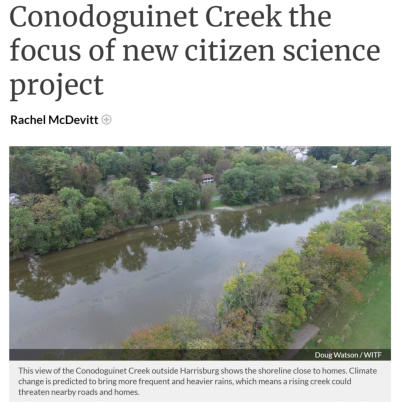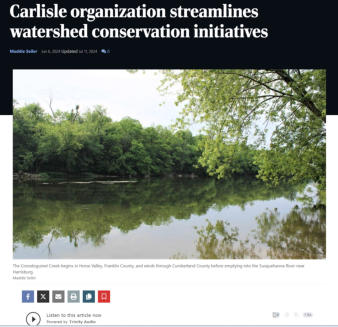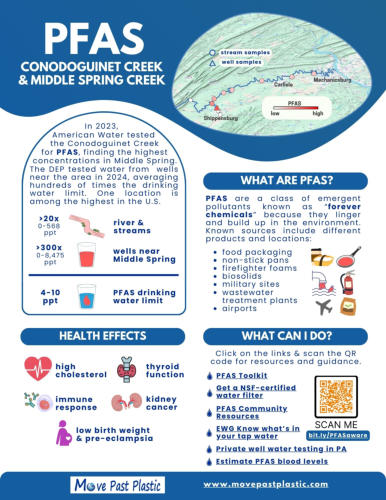

Move Past Plastic, MPP

Sponsored by TLC Foundation

© Lorem ipsum dolor sit Nulla in mollit pariatur in, est ut dolor eu eiusmod lorem
Welcome
“Antonio Gramsci famously
imparted: “Pessimism of the
intellect, optimism of the will.
Creek Defenders Final Recommendation
Report
Creek Defenders Map
o The map has or will display information on watersheds, pollution, human health metrics, political data, environmental justice community data, and more.Creek Defender Pollution Report Form
o Report pollution, diseased and dead wildlife. o This online community engagement tool documents pollution in the Conodoguinet Creek watershed (and any US watershed). It includes fields for pollutant type, location, comments, and pictures Creek Snapshoto
Add a photo, news, pollution, and watershed
events to our gallery! All photos will be
reviewed and must be appropriate and
respectful. Remember to include
COUNTY/TOWN, DATE, and a NOTE[
CLICK on Creek Defenders Participation
Form
What Can You o to Protect Yourself From
PFAS in Your Drinking Water
How to Minimize PFAS Health Harms Flier
in English
How to Minimize PFAS Health Harms Flier
in Español
How to Minimize Plastic Health Harms
Flier in English
How to Minimize Plastic Health Harms
Flier in Spanish
Request Artificial Playing Surfaces Toolkit
Join the SUP Reduction TeamMPP SUP
MPP Reuse Toolkits Request Form
Actions for ditching disposables and moving toward
reusables
Living Plastic & PFAS Free Product
Guide Guide
•Creek Defenders
Creek Defenders (CD) Newsletters
Volume 4, March 2025 - PFAS in Your Watershed
Volume 3 February 2025 - Microplastic and Health
Volume 2, January 2025 - CD at work
Volume 1 December 2025 - Creek Defenders Team
attend AGU24 to present a poster on Dec. 9th!
Advocacy Team Builder Mixer
July ? 2025
Are you concerned about plastics pollution and its connection to climate and watershed harms but don't know where and how to get involved, join us! We need you, your groups, organizations, and businesses from the South Central PA area to join Move Past Plastic (MPP) friends in reducing the harm caused by plastic pollution and its impacts on climate. Network with others and take action to protect our watershed communities! While individual action steps are essential, we can expand our influence with policymakers, legislators, schools, and businesses as a strong team network. Please join us and share your ideas, interests, and concerns. And be prepared to have fun as we get to know each other and share ideas! RSVPIdentification of Pollutants in the
Conodoguinet Creek Watershed: A
Recommendation for Protection.
An environmental stewardship projectA Community-driven Framework for
Assessing Health/Environmental Risk in
the Conodoguinet Creek Watershed
This project is a collaboration with AGU Thriving Earth Exchange. It aims to protect the Conodoguinet Creek watershed by collecting and analyzing data from multiple sources to assess environmental risks and impacts, contribute to environmental education, and raise community awareness. The Creek Defenders Pollution Report Form & Map will be presented and reviewed, along with initial observations. We will review the design of the health risk model.Introduction the Creek Defender Project for the
Conodoguinet Creek Watershed Webinar Recording
NEWS on the Projecto
July 2024 Forests for the Bay Newsletter
• News Around the Watershed, under Pennsylvaniao
Conodoguinet Creek the focus of new citizen
science project, State Impact PA, by Rachel
McDevitt, June 20th, 2024
o
Carlisle organization streamlines watershed
conservation initiatives, by Maddie Seiler
June 6th, 2024 Updated Jun 12th, 2024 Sentinel
Newspaper
o
o
5/22/24 MPP News Release Intro. ID Pollutant
o
How PFAS, microplastics join forces as a
synergistic threat, by Tamela Trussell, from
The Bay Journal, May 7th, 2024
Move Past Plastics created the project proposal with the Environmental Protection Network. An AGU Thriving Earth Exchange grant was awarded to further this project. This project will help improve the watershed's health by aggregating siloed data into one location and map. This information and existing qualitative and quantitative data will be analyzed in a final report to conclude further testing, monitoring, and protecting the Conodoguinet Creek watershed. We welcome any research, history, and stories you want to share, including biological, chemical, physical, wildlife, and human health indicators. Please share this with your community groups, organizations, church, friends, and family. JOIN our team to collaborate on this project!!! Below i s a list of ways you and your organization can help.CLICK on Creek Defenders Participation
Form
Harms from Synthetic Playing Surfaces
To combat the harms from from artifical playing
surfaces
Request Artificial Playing Surfaces Toolkit
Recording of CD Final
Recommendation 3/18/25
Thanks to everyone who
contributed to this project and the
community members for your
interest and support.
Thank You Credits (1:30 sec.)
o
To learn more, you can visit the following link:Harms from Synthetic Playing Surfaces
PA Constitution - Article 1 Section 27
Natural resources and the public estate.
The people have a right to clean air, pure water, and to the preservation of the natural, scenic, historic and esthetic values of the environment. Pennsylvania's public natural resources are the common property of all the people, including generations yet to come. As trustee of these resources, the Commonwealth shall conserve and maintain them for the benefit of all the people. . MPP ACTION Actions • The proposed AGU Thriving Earth Exchange project, Identification of Pollutants in the Conodoguinet Creek Watershed: A Recommendation for Protection o Partners AGU Thriving Earth Exchange project, Anthropocene Alliance (A2), and a core team of volunteers including: Community Science Fellow, Shashank Anand, a team of three Community Scientists, Chiara Smorada, Marissa Kulkarni, Astrid Lozano-Acosta, and a local community member Karen Green co-founded Pidcock Creek Watershed Association A Conversation of the Impacts of SUP on the Health and the Environment. Partners Bosler Library, South Central PA Climate Realty, Beyond Plastics, US Composting Council, FoCo Trash Mob, US Reduces, BYO, … • Synthetic Playing Surfaces harming our youth, Partnering with Safe and Healthy Playing Fields , Healthy Playing Surfaces & Beyond Plastic reaching out to municipalities • PFAS Campaign o Drinking and wastewater testing reaching out to municipalities and residents with wells, personal avoidance, land spreading of biosolids Partnering with LWVPA, PFAS-action-group. National PFAS Contamination Coalition o Halt the Harm also announced our new PFAS Campaign Accelerator Online Course! o PFAS legislation • Chemical Recycling Plant - partnering with organizations including Beyond Plastics (BP) and Save Our Susquehanna (SOS) to stop Chemical Recycling plants. We are working to stop the construction of the Encina Point Township plant. • Zero Waste PA legislation, Partnering with LWVPA, Upstream, Beyond Plastic, Note the Packaging Reduction and Recycling Infrastructure Act (S.4246-a/A.5322-a) of NY. Do we want to do something like this? • Reusables in restaurants, Partnering with Beyond Plastic, FoCo Flash Mob Panera & Spoons- Sustainability Feedback • BYO - US Reduces for Pennsylvania Partnering with BYO • Reuse in Schools and Colleges/Universities Partnering with Upstream and Cafeteria Culture • Participate in Planning the MPP Sustainable Fashion Show • NO PVC for replacing lead pipes with IRA funds- reaching out to municipalities REPORT: The Perils of PVC Plastic Pipes • Great news to share with you! The Break Free From Plastic Pollution Act, Senate Bill 3217, and House Resolution 6053 were reintroduced this week by Senator Jeff Merkley (D-OR) and Congressmember Jared Huffman (D-CA-02) Celebrate your journey to move away from single-use plastic (SUP): • Becoming informed about the entire plastic life cycle • Understand environmental and health harms from single-use plastic, SUP • Recognize recycling and chemical or advanced recycling is a false solution • Realize single-use plastic is more than a litter problem it is a crime of chemical toxicity • Joining together to make changes by supporting campaign partners • Take local civic actions Support strong Legislation outlined in the Break Free From Plastic Pollution ActTackling SUP Community Resources for
South Central Pennsylvania
Learn more about PFAS and how you canprotect your drinking water and participate
in the PFAS Campaign
Recording
PPT
Complete Chat
Request for MPP's Artificial Playing
Surfaces (AFP) Toolkit
It includes those provided by our guest panelists. It has a complete section on Alternatives to APSINVITE: Your communities parents, watershed
organizations, NGOs, school district personnel, parks
and recreation and athletic directors, municipal
officials, and community organizations.
This will be an opportunity to discuss the existing science, environmental, and human health impacts of artificial playing surfaces. The expert panelists welcome your questions, insights, and experiences. Our communities have an active population of concerned citizens and organizations that protect our watersheds. As environmental stewards, we must raise awareness about the growing plastic pollution problem and its connection to climate change, from plastic production to weather events that increase the amount of toxins entering our watersheds, including those from artificial playing surfaces. We hope this information reaches our communities and municipal leaders in charge of developing Water Assessment, Climate Action, and Land Preservation Plans.Please share widely.
Guest experts: Dr. Sarah F. Evans, PhD, MPH, is an Assistant Professor in the Department of Environmental Medicine and Climate Science and a member of the Institute for Climate Change, Environmental Health, and Exposomics at the Icahn School of Medicine at Mount Sinai. Dianne Woelke, MSN, is a Member of the Board at Safe Healthy Playing Fields Inc. Tamara Rubin, the founder of Lead Safe Mama, LLC, is an internationally recognized, multiple federal award-winning lead-poisoning prevention advocate and documentary filmmaker. Dr. Kyla Bennett works as Science Policy Director at Public Employees for Environmental Responsibility (PEER) Christina Dubin, Community Organizer at Beyond Plastics Jeff Fowler, Penn State Extension, Board of Directors of the Pennsylvania Chapter of Sports Turf Managers (KAFMO) Dr. Kathleen Michels, Neuroscientist and a founding Board member of Safe Healthy Playing Fields and One Montgomery Green. She also served on the public health and zero waste committees of the Maryland ----------------------------------------------------------------PA Constitution - Article 1 Section 27
Natural resources and the public estate.
The people have a right to clean air, pure water, and to the preservation of the natural, scenic, historic and esthetic values of the environment. Pennsylvania's public natural resources are the common property of all the people, including generations yet to come. As trustee of these resources, the Commonwealth shall conserve and maintain them for the benefit of all the people. .


Lending a helping hand.


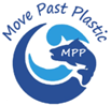



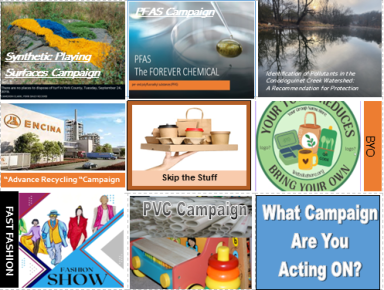





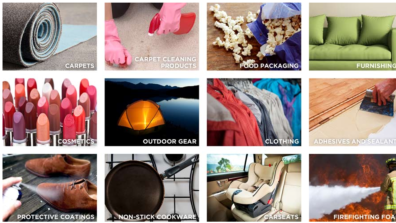
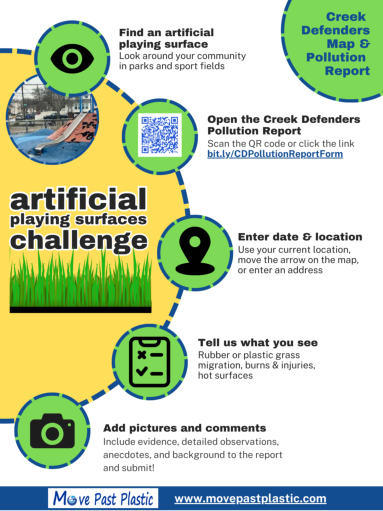
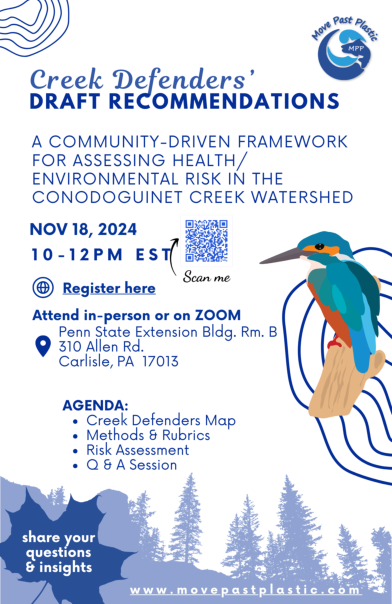
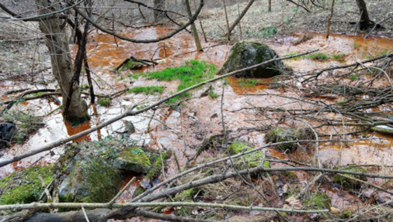
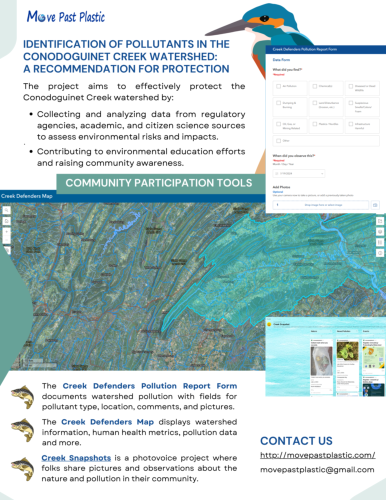
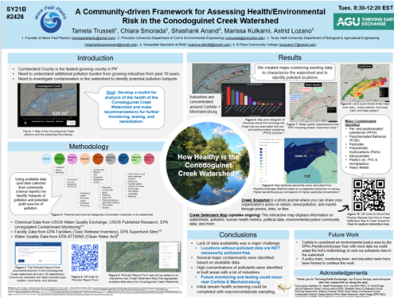




Move Past Plastic, MPP

Sponsored by TLC Foundation

© Lorem ipsum dolor sit Nulla in mollit pariatur in, est ut dolor eu
eiusmod lorem
Welcome
“Antonio Gramsci famously imparted:
“Pessimism of the intellect, optimism
of the will.
Creek Defenders Final Recommendation
Report
Creek Defenders Map
o The map has or will display information on watersheds, pollution, human health metrics, political data, environmental justice community data, and more.Creek Defender Pollution Report
Form
o Report pollution, diseased and dead wildlife. o This online community engagement tool documents pollution in the Conodoguinet Creek watershed (and any US watershed). It includes fields for pollutant type, location, comments, and pictures Creek Snapshoto
Add a photo, news, pollution, and watershed
events to our gallery! All photos will be
reviewed and must be appropriate and
respectful. Remember to include
COUNTY/TOWN, DATE, and a NOTE[
CLICK on Creek Defenders Participation
Form
What Can You o to Protect Yourself From
PFAS in Your Drinking Water
How to Minimize PFAS Health Harms
Flier in English
How to Minimize PFAS Health Harms
Flier in Español
How to Minimize Plastic Health
Harms Flier in English
How to Minimize Plastic Health
Harms Flier in Spanish
Request Artificial Playing Surfaces
Toolkit
Join the SUP Reduction TeamMPP
SUP
MPP Reuse Toolkits Request Form
Actions for ditching disposables and moving toward
reusables
Living Plastic & PFAS Free Product Guide
Guide
•Creek Defenders
Creek Defenders (CD) Newsletters
Volume 4, March 2025 - PFAS in Your Watershed
Volume 3 February 2025 - Microplastic and Health
Volume 2, January 2025 - CD at work
Volume 1 December 2025 - Creek Defenders Team
attend AGU24 to present a poster on Dec. 9th!
Advocacy Team Builder Mixer
July ? 2025
Are you concerned about plastics pollution and its connection to climate and watershed harms but don't know where and how to get involved, join us! We need you, your groups, organizations, and businesses from the South Central PA area to join Move Past Plastic (MPP) friends in reducing the harm caused by plastic pollution and its impacts on climate. Network with others and take action to protect our watershed communities! While individual action steps are essential, we can expand our influence with policymakers, legislators, schools, and businesses as a strong team network. Please join us and share your ideas, interests, and concerns. And be prepared to have fun as we get to know each other and share ideas! RSVPIdentification of Pollutants in the
Conodoguinet Creek Watershed: A
Recommendation for Protection.
An environmental stewardship projectA Community-driven Framework for
Assessing Health/Environmental
Risk in the Conodoguinet Creek
Watershed
This project is a collaboration with AGU Thriving Earth Exchange. It aims to protect the Conodoguinet Creek watershed by collecting and analyzing data from multiple sources to assess environmental risks and impacts, contribute to environmental education, and raise community awareness. The Creek Defenders Pollution Report Form & Map will be presented and reviewed, along with initial observations. We will review the design of the health risk model.Introduction the Creek Defender Project for the
Conodoguinet Creek Watershed Webinar
Recording
NEWS on the Projecto
July 2024 Forests for the Bay Newsletter
• News Around the Watershed, under Pennsylvaniao
Conodoguinet Creek the focus of new
citizen science project, State Impact PA, by
Rachel McDevitt, June 20th, 2024
o
Carlisle organization streamlines
watershed conservation initiatives, by
Maddie Seiler June 6th, 2024 Updated Jun
12th, 2024 Sentinel Newspaper
o
o
5/22/24 MPP News Release Intro. ID
Pollutant
o
How PFAS, microplastics join forces as a
synergistic threat, by Tamela Trussell, from
The Bay Journal, May 7th, 2024
Move Past Plastics created the project proposal with the Environmental Protection Network. An AGU Thriving Earth Exchange grant was awarded to further this project. This project will help improve the watershed's health by aggregating siloed data into one location and map. This information and existing qualitative and quantitative data will be analyzed in a final report to conclude further testing, monitoring, and protecting the Conodoguinet Creek watershed. We welcome any research, history, and stories you want to share, including biological, chemical, physical, wildlife, and human health indicators. Please share this with your community groups, organizations, church, friends, and family. JOIN our team to collaborate on this project!!! Below i s a list of ways you and your organization can help.CLICK on Creek Defenders
Participation Form
Harms from Synthetic Playing
Surfaces
To combat the harms from from artifical playing
surfaces
Request Artificial Playing Surfaces
Toolkit













Recording of CD Final
Recommendation 3/18/25
Thanks to everyone who
contributed to this project
and the community members
for your interest and support.
Thank You Credits (1:30 sec.)
o
To learn more, you can visit the following link:Harms from Synthetic Playing
Surfaces
PA Constitution - Article 1 Section
27
Natural resources and the public estate.
The people have a right to clean air, pure water, and to the preservation of the natural, scenic, historic and esthetic values of the environment. Pennsylvania's public natural resources are the common property of all the people, including generations yet to come. As trustee of these resources, the Commonwealth shall conserve and maintain them for the benefit of all the people. . MPP ACTION Actions • The proposed AGU Thriving Earth Exchange project, Identification of Pollutants in the Conodoguinet Creek Watershed: A Recommendation for Protection o Partners AGU Thriving Earth Exchange project, Anthropocene Alliance (A2), and a core team of volunteers including: Community Science Fellow, Shashank Anand, a team of three Community Scientists, Chiara Smorada, Marissa Kulkarni, Astrid Lozano-Acosta, and a local community member Karen Green co- founded Pidcock Creek Watershed Association A Conversation of the Impacts of SUP on the Health and the Environment. Partners Bosler Library, South Central PA Climate Realty, Beyond Plastics, US Composting Council, FoCo Trash Mob, US Reduces, BYO, … • Synthetic Playing Surfaces harming our youth, Partnering with Safe and Healthy Playing Fields , Healthy Playing Surfaces & Beyond Plastic reaching out to municipalities • PFAS Campaign o Drinking and wastewater testing reaching out to municipalities and residents with wells, personal avoidance, land spreading of biosolids Partnering with LWVPA, PFAS-action-group. National PFAS Contamination Coalition o Halt the Harm also announced our new PFAS Campaign Accelerator Online Course! o PFAS legislation • Chemical Recycling Plant - partnering with organizations including Beyond Plastics (BP) and Save Our Susquehanna (SOS) to stop Chemical Recycling plants. We are working to stop the construction of the Encina Point Township plant. • Zero Waste PA legislation, Partnering with LWVPA, Upstream, Beyond Plastic, Note the Packaging Reduction and Recycling Infrastructure Act (S.4246-a/A.5322-a) of NY. Do we want to do something like this? • Reusables in restaurants, Partnering with Beyond Plastic, FoCo Flash Mob Panera & Spoons- Sustainability Feedback • BYO - US Reduces for Pennsylvania Partnering with BYO • Reuse in Schools and Colleges/Universities Partnering with Upstream and Cafeteria Culture • Participate in Planning the MPP Sustainable Fashion Show • NO PVC for replacing lead pipes with IRA funds- reaching out to municipalities REPORT: The Perils of PVC Plastic Pipes • Great news to share with you! The Break Free From Plastic Pollution Act, Senate Bill 3217, and House Resolution 6053 were reintroduced this week by Senator Jeff Merkley (D-OR) and Congressmember Jared Huffman (D-CA-02) Celebrate your journey to move away from single-use plastic (SUP): • Becoming informed about the entire plastic life cycle • Understand environmental and health harms from single-use plastic, SUP • Recognize recycling and chemical or advanced recycling is a false solution • Realize single-use plastic is more than a litter problem it is a crime of chemical toxicity • Joining together to make changes by supporting campaign partners • Take local civic actions Support strong Legislation outlined in the Break Free From Plastic Pollution ActTackling SUP Community Resources for
South Central Pennsylvania
Learn more about PFAS and how you canprotect your drinking water and
participate
in the PFAS Campaign
Recording
PPT
Complete Chat
Request for MPP's Artificial
Playing Surfaces (AFP) Toolkit
It includes those provided by our guest panelists. It has a complete section on Alternatives to APSINVITE: Your communities parents, watershed
organizations, NGOs, school district personnel,
parks and recreation and athletic directors,
municipal officials, and community
organizations.
This will be an opportunity to discuss the existing science, environmental, and human health impacts of artificial playing surfaces. The expert panelists welcome your questions, insights, and experiences. Our communities have an active population of concerned citizens and organizations that protect our watersheds. As environmental stewards, we must raise awareness about the growing plastic pollution problem and its connection to climate change, from plastic production to weather events that increase the amount of toxins entering our watersheds, including those from artificial playing surfaces. We hope this information reaches our communities and municipal leaders in charge of developing Water Assessment, Climate Action, and Land Preservation Plans.Please share widely.
Guest experts: Dr. Sarah F. Evans, PhD, MPH, is an Assistant Professor in the Department of Environmental Medicine and Climate Science and a member of the Institute for Climate Change, Environmental Health, and Exposomics at the Icahn School of Medicine at Mount Sinai. Dianne Woelke, MSN, is a Member of the Board at Safe Healthy Playing Fields Inc. Tamara Rubin, the founder of Lead Safe Mama, LLC, is an internationally recognized, multiple federal award-winning lead-poisoning prevention advocate and documentary filmmaker. Dr. Kyla Bennett works as Science Policy Director at Public Employees for Environmental Responsibility (PEER) Christina Dubin, Community Organizer at Beyond Plastics Jeff Fowler, Penn State Extension, Board of Directors of the Pennsylvania Chapter of Sports Turf Managers (KAFMO) Dr. Kathleen Michels, Neuroscientist and a founding Board member of Safe Healthy Playing Fields and One Montgomery Green. She also served on the public health and zero waste committees of the Maryland ----------------------------------------------------------------PA Constitution - Article 1 Section
27
Natural resources and the public estate.
The people have a right to clean air, pure water, and to the preservation of the natural, scenic, historic and esthetic values of the environment. Pennsylvania's public natural resources are the common property of all the people, including generations yet to come. As trustee of these resources, the Commonwealth shall conserve and maintain them for the benefit of all the people. .






















